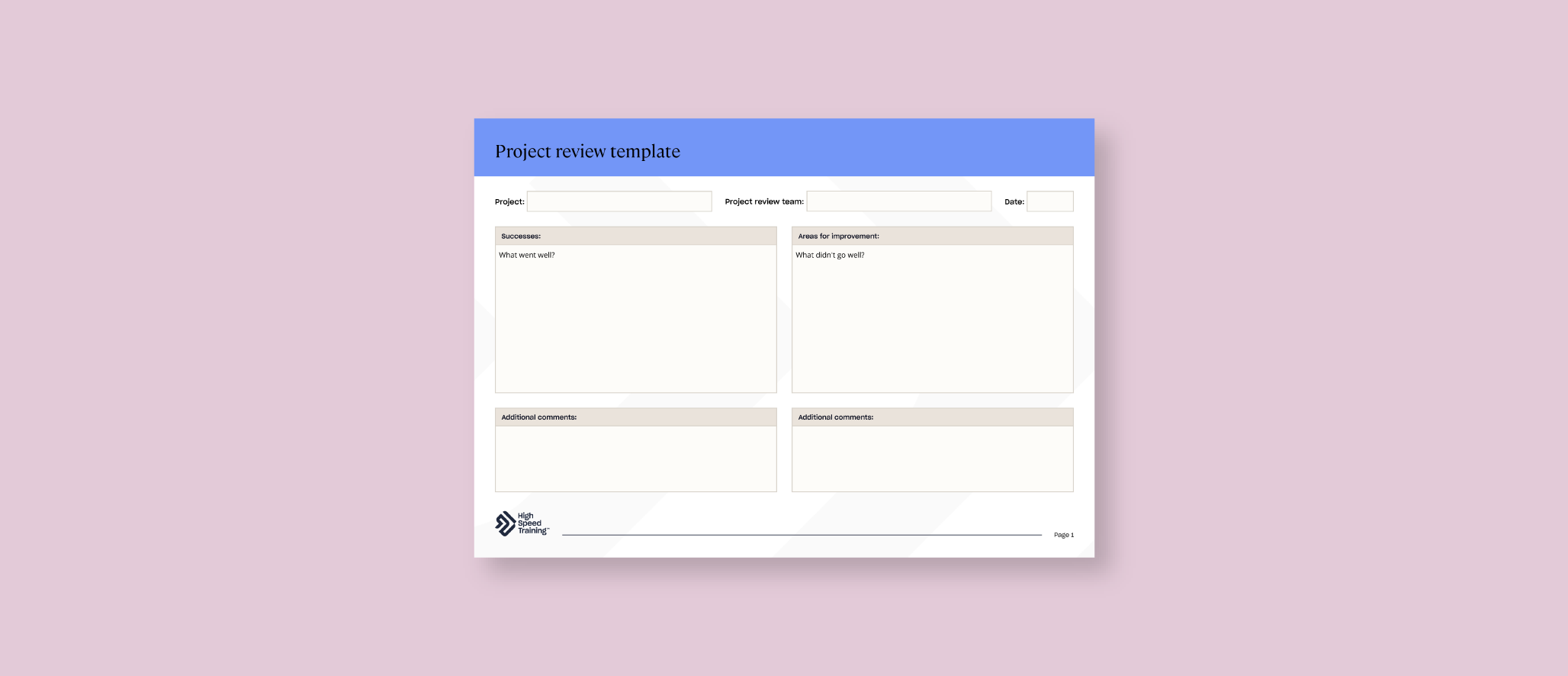Project Review: Free Template
Projects are a common part of working life and irrespective of role or industry, most employees will have to complete a project as part of their work at some point in their career. Whilst level of involvement may change from person to person, taking the time to review a project and its success is an important part of professional development. In this article we will outline what a project review is and how you can go about conducting different types of project reviews. We will also provide you with a free template that you can use to conduct your project reviews.
What is a Project Review?
Much like it says on the tin, a project review is a means to assess the success of a project. Whilst project review and project audit are often used interchangeably they do typically refer to different things. A project audit is a more rigorous examination of a project and its process and procedures. Audits are typically conducted by external parties who were not involved in the project so that they can perform an objective dissection of the project. Audits tend to focus on compliance to set legal requirements or internal processes. Comparatively, a project review is a more informal examination of a project, namely, its successes and failures, the implementation practices used and conclusive recommendations that can help to improve future projects.

A project review is an important part of professional development as it enables you to identify what worked well and what needs improvement. This ensures that your next project runs smoothly and that any lessons learned from previous projects are implemented in a tangible and effective manner. Making a project review a core part of running your project will enable you to continuously improve processes and in turn the efficacy of your projects. Much like a project plan, a project review provides a useful framework which can be used for self-evaluation and an assessment of the overall success of a project.
Project Review Process
A project review can be conducted in different ways and the best type of project review will depend on your project, your team and the intended outcomes of the review. For example, some reviews may be more quantitative based and focus on what metrics were reached and numerical targets met. Comparatively, some reviews may be more qualitative and focus on what lessons were learnt, how teams worked together and the outcome of the project regardless of the numbers. Examples of the different types of project review will be explored later in this article.
Whilst there are different ways in which a project can be reviewed, most project reviews will follow the same general process. You may find that you need to make some slight changes to the process to suit your particular type of review, however most processes should include the following steps:
- Gather your review team – Decide who you want to be involved in the review process and invite them to participate. It may not be necessary for every person who was part of the project to be a part of the review so take the time to consider who needs to be involved. It may be key stakeholders or members of the team who had a more senior role in the project. When gathering your team ensure that there is an appropriate amount of time between the project ending and reviewing it. This may be determined by people’s availability or what the project actually was and whether you need to allow some time to fully assess the success of it. Either way, make sure that all involved have enough time so that they can come to any project review discussions with well thought out considerations and reflections.
- Prepare a framework – A framework is not necessarily the same as a template and it can be a useful means to guide discussion and ensure that you review the necessary areas. Reviewing a project in its entirety can be a gargantuan task and so knowing what you specifically want to focus on is an important part of managing your time efficiently. A framework can support a more targeted approach and include lessons learned, retrospectives and an assessment of the highs and lows of the project.

- Establish house rules – A project review is a chance for multiple people to come together and assess how a project went. Without establishing house rules this can quickly descend into a case of too many cooks. A good mentality to adopt when conducting a project review and establishing house rules is the Prime Directive for retrospective. Introduced by Norman Kerth the Prime Directive states that ‘regardless of what we discover, we understand and truly believe that everyone did the best job they could, given what was known at the time, their skills and abilities, the resources available, and the situation at hand.’ Implementing this directive can help to ensure that all feedback is constructive and that the review is approached with a collaborative mindset.
- Guide the discussion – Project reviews can be conducted by anyone and should be seen as a collaborative exercise. However, it can be beneficial to have one individual, such as a project manager or a member of senior management, who guides the discussion, ensures that house rules are followed and that focus is directed in the right place. Assigning someone this role keeps things on track and ensures that everyone has time to talk and address any areas of concern.
- Share the findings – After the review share a summary of the discussion and any actions that are to be taken by those in attendance. A review will help to highlight what went well and what needs to be improved and so sharing this information with those involved enables everyone to learn from the review and implement the necessary changes going forward.
Want to Learn More?
High Speed Training has a wide range of Business Essentials courses that can provide you with the knowledge to complete a project effectively and efficiently. Courses such as our Time Management and Leadership and Management courses will teach you the necessary skills to approach projects with confidence.
Types of Project Review
As mentioned, whilst most project reviews will follow the same general process, there are several different types of project review. It’s also important to note that a project review can occur at any stage of a project’s lifecycle, not solely upon its completion.
Below you will find some examples of the different types of project review. The list is not exhaustive and you may decide to implement different review types at the same time in order to gain a more holistic view of the success of a project.
Common types of project reviews include:
- Milestone Review – These are conducted at different pre-set milestones in the project’s timeline and are a means to assess the project’s progress and continued alignment. Milestone reviews help those involved to stay on track and make any necessary adaptations to ensure the project runs smoothly.
- Phase Gate Review – These are conducted at different phases of a project and require breaking a project into clear stages. At each transitional stage the project is reviewed before moving onto the next phase.
- Post-Implementation Review – These are conducted upon completion of the project and focus on evaluating the outcomes of a project and whether set goals and objectives were achieved.
- Lessons Learned Review – These reviews can be seen as qualitative and focus on what knowledge and experience was gained throughout the lifecycle of the project, rather than the end result. These lessons can then be implemented for future projects to improve their performance.
- Performance Review – These reviews evaluate a project’s performance and progress. The findings of a performance review can then be used to identify areas for improvement and to make decisions that can improve future projects.
- Closure Review – These are conducted at the end of a project and can be seen as a combination of other review formats in that it seeks to evaluate a project’s overall performance, the outcomes and lessons learned.
- Methodology Review – These reviews assess the processes used during a project, examining the efficacy of the method in order to gauge strengths, weaknesses and areas for improvement.
Project Review Template
Below you will find a template that you can use to guide your next project review. There are several ways to conduct a project review and each type of review may require different metrics to be measured. As such, the provided template should be used as a general framework which can be built upon for a more detailed or specific review.

Project reviews are a key part of the project process and provide you with the chance to learn from mistakes, highlight successes and make improvements. A well conducted review does not seek to blame or justify failures, but rather to increase efficiency and support professional growth. These insights can then be applied to future projects ensuring that each project runs smoother than the last.
Further Resources:
- Project Plan: Free Template
- What is Critical Reflection?
- A Personal Development Plan (PDP) Guide & Template
- Business Essentials Courses







